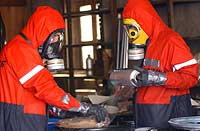 Kathmandu's water could be in danger of being seriously contaminated. Greenpeace volunteers have begun packaging toxic pesticide waste at an unsecured storage facility at Khumaltar. The group, which says the waste poses a severe danger to Kathmandu's drinking water supplies, has prepared a detailed inventory of the waste and the companies that manufactured the products. In addition, the activists have secured the toxins in larger barrels and asked the companies concerned to collect and safely dispose of the poison. The toxic waste in Khumaltar, which originated in companies in Germany, Netherlands, USA, Japan and India, includes 18 organichlorides (which travel swiftly up the food chain and are carcinogenic), 5 heavy metals (including mercury compounds, banned in Europe and the US many years ago due to their cancer-causing properties) and 20 other classes of chemicals. The larger companies listed on the inventory include the German Bayer AG, Dutch Shell, Swiss Ciba Gegy and Sandoz, American DuPont and Monsanto, and Japanese Sumitomo. Most of the pesticides were imported under aid projects aimed at increasing agricultural yield.
Kathmandu's water could be in danger of being seriously contaminated. Greenpeace volunteers have begun packaging toxic pesticide waste at an unsecured storage facility at Khumaltar. The group, which says the waste poses a severe danger to Kathmandu's drinking water supplies, has prepared a detailed inventory of the waste and the companies that manufactured the products. In addition, the activists have secured the toxins in larger barrels and asked the companies concerned to collect and safely dispose of the poison. The toxic waste in Khumaltar, which originated in companies in Germany, Netherlands, USA, Japan and India, includes 18 organichlorides (which travel swiftly up the food chain and are carcinogenic), 5 heavy metals (including mercury compounds, banned in Europe and the US many years ago due to their cancer-causing properties) and 20 other classes of chemicals. The larger companies listed on the inventory include the German Bayer AG, Dutch Shell, Swiss Ciba Gegy and Sandoz, American DuPont and Monsanto, and Japanese Sumitomo. Most of the pesticides were imported under aid projects aimed at increasing agricultural yield. Greenpeace activists have been trying to organise the garage-like storage facility since July last year. They found the walls of the store lined with unstable, rusty iron shelving, filled with hundreds of tins, bottles, bags and cans, the contents of some spilling over, and mummified corpses of rats and cockroaches caught between the crates. "Verbally the companies are positive (about helping with the clean-up), but have to date refused to take initiative. They never do unless pressed to," says Greenpeace's Andreas Bernstorff, leader of the Khumaltar clean-up operation. "We're now doing first aid work, that is putting everything in safe packages for transport." In Germany, a spokesman for Bayer AG told the German newspaper Bild am Sonntag that if indeed it were true that his company's products were identified, it would contribute towards the detoxification process.
Bayer has the largest waste deposits in Khumaltar, including organic mercuric-chloride (Agallol 3, Ceresan) which is banned in most developed countries. Others, such as DuPont's dozen bags of Marlate (50 percent DDT), and Shell's Dieldrin, of which there are a number of 50 kg sacks in Khumaltar, have also long been out of use. By the Stockholm Convention 2001, all stores and stocks of such old pesticides have to be destroyed. At present Nepal has over 74 tons of obsolete pesticides stored in Amlekhgunj (50 tons), Nepalgunj (20 tons) and Khumaltar, which is estimated to hold about five tons.


